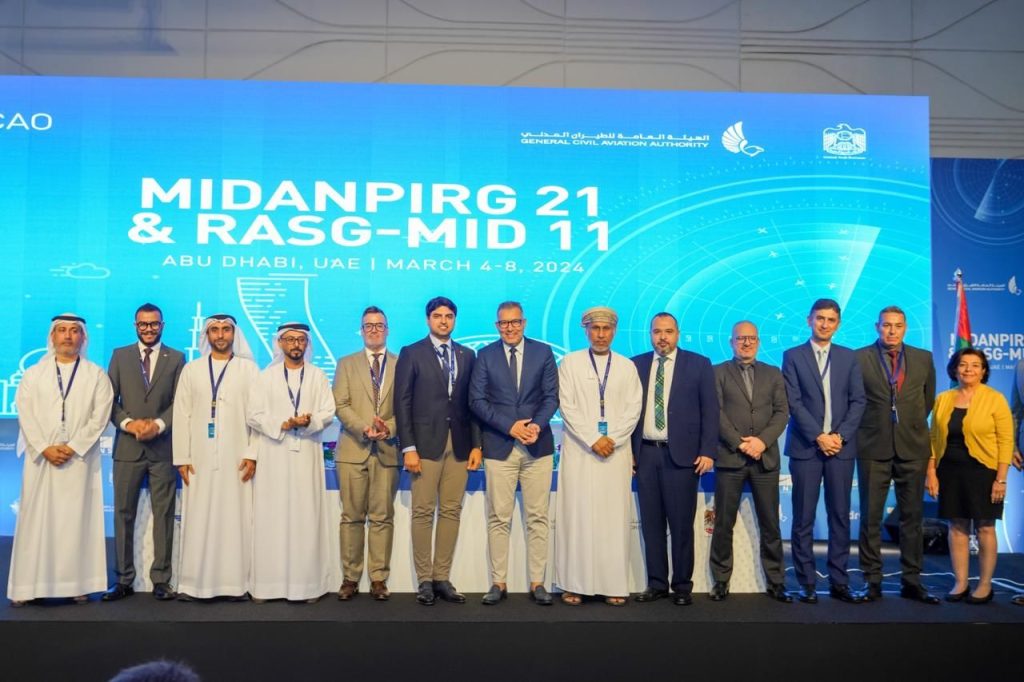
ABU DHABI, 11th March, 2024 (WAM) – Aviation officials and experts in the Middle East have expressed their support for the Abu Dhabi Declaration, which sets out a common framework for the continuous improvement of air navigation services in the region.
This came during the Twenty-First Meeting of the Middle East Air Navigation Planning and Implementation Regional Group (MIDANPIRG/21), which was hosted by the UAE in Abu Dhabi last week.
The declaration, which was put forward by the team of the UAE General Civil Aviation Authority (GCAA), represents a regional commitment to promoting continuous cooperation, improving safety procedures, increasing operational efficiency, and promoting sustainability practices in the field of air navigation.
This Declaration takes on particular importance at the present time in light of the urgent need for modernisation and flexible improvements in air navigation services in the region, and the growing demand to enhance the capacity, efficiency and safety of these services, as a result of the increase in the volume of global air traffic.
The support for Abu Dhabi Declaration represents a decisive step towards achieving a harmonious and high-performance air navigation system in the Middle East, setting a global example for cooperation and innovation in the aviation industry.
The key principles of the Declaration run as follows:
-Collaborative Framework: Establish a collaborative framework to facilitate effective communication and coordination among MIDANPIRG members, promoting shared resources and expertise in air navigation services.
-Safety Enhancement: Prioritise safety standards and best practices, emphasizing continuous improvement in air navigation systems to ensure the highest level of safety for both passengers and aviation stakeholders.
-Efficiency Optimisation: Strive for efficiency through strategic airspace utilization and leveraging technological advancements, aiming to significantly enhance the efficiency and reduce delays within the Airspace of the MID Region, increase capacity and reduce complexity.
-Sustainability Integration: Integrate sustainable practices into air navigation planning and implementation, considering environmental impact, resource conservation, and the development of ecofriendly technologies to contribute to a greener aviation industry; minimize the operation impact on environment, targeting 3% reduction of operational CO2 emission over a duration of 5 year.
-Capacity Building and Resilience: Focus on capacity building initiatives to enhance the resilience of air navigation systems, ensuring they can adapt to evolving challenges, technological advancements, and increased demand for air travel, thereby maintaining operational robustness and reliability.
-Stakeholder Engagement and Inclusivity: Emphasize active engagement with diverse stakeholders, including governments, aviation authorities, industry representatives, and local communities, fostering inclusivity to identify challenges and concerns, propose mitigations, and collectively initiate comprehensive projects and initiatives shaping the future of the MID region air navigation system.
Saif Mohammed Al Suwaidi, Director General of the General Civil Aviation Authority (GCAA), said that the wide support for the Abu Dhabi Declaration reflects the keenness of aviation officials in the Middle East region to enhance coordination and cooperation in managing and developing air traffic movement, according to common principles that serve the development agendas of the member states and enhance the quality and efficiency of air traffic at the regional level.
Al Suwaidi added: “We look forward to the ‘Abu Dhabi Declaration’ serving as a model for regional cooperation in developing and improving air navigation efficiency.”
Engineer Mohamed Abubaker Farea, Director of the Regional Office of the International Civil Aviation Organssation (ICAO) in the Middle East, lauded the principles of the ‘Abu Dhabi Declaration’ and the efforts of the UAE General Civil Aviation Authority in promoting regional cooperation to improve air navigation services in the region.
He added that this declaration represents an important step towards promoting safety, efficiency and sustainability in the aviation sector in the Middle East, expressing his hope for more cooperation and coordination at the regional level to achieve the common goals of improving the level of services and developing air navigation.
Ahmed Ibrahim Al Jallaf, Assistant Director General for Air Navigation Services Sector at the General Civil Aviation Authority and Chairman of the Regional Air Navigation Planning and Implementation Group, affirmed that the ‘Abu Dhabi Declaration’ defines a strategic framework that focuses on joint planning and implementation of air navigation through effective coordination between members of the Planning and Implementation Group in the Middle East. This aims, he continued, to ensure continuous and flexible improvements in the provision of air navigation services in the region and achieve safer, more efficient and sustainable air travel.
The 21st meetings of the Regional Air Navigation Planning and Implementation Group and the 11th Meeting of the Regional Aviation Safety Group in the Middle East witnessed a wide regional presence over five working days, with the total number of participants exceeding 240 officials and specialists in the aviation sector, and the total number of papers presented exceeding 100 papers from member states and relevant regional organisations.
In addition, the Knowledge Month initiative for the Future of Air Navigation Services, which was established by the UAE General Civil Aviation Authority in cooperation with the International Civil Aviation Organisation and the Arab Civil Aviation Organisation, attracted distinguished participation.
Monday - Friday: 8:00 AM - 4:00 PM
Saturday - Sunday: Holiday
CANS © 2024. All Rights Reserved.